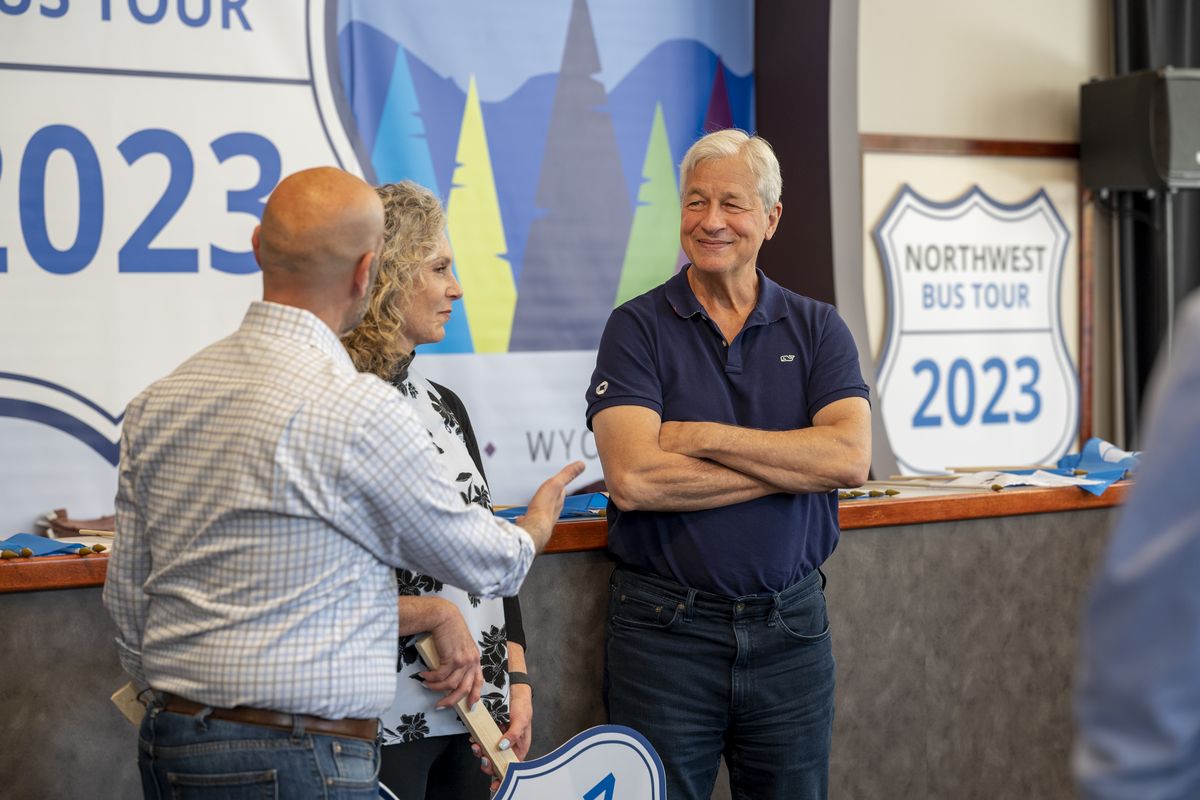CEO of the world’s largest bank visits Spokane

Jamie Dimon, the billionaire CEO and chairman of banking giant JP Morgan Chase, predicts that American homebuyers have not seen the worst of rising interest rates.
And during his first stop in Spokane on Monday, he did not predict whether the country will avoid a recession.
“No one knows the future, but as a business person I am prepared for a recession,” Dimon said.
He thinks people will be surprised how long high interest rates will last, but assures it could be worse.
“When I graduated business school, short-term interest rates were at 21%,” he said. “That was high.”
Spokane should prepare for further increase to both short-term and long-term rates of up to a full percent point, Dimon said.
Dimon also has a grim view of inflation, which he believes will remain high due to deficit spending by governments around the world on their militaries and economy. But the most substantial driver of inflation is the outstanding coronavirus-era stimulus monies, he said.
“There is still a lot of fiscal and monetary stimulus out there. I think the government was right to react quickly to recover from COVID, but that’s what’s really driving inflation,” Dimon said.
High inflation and raising interest rates can harm small and large businesses alike. To withstand the worst, Dimon recommends small businesses take a hard look at their most critical input costs.
“Some businesses use a lot of oil, some use food, some interest rates or credit. Whatever inputs affect your business most, I would prepare for more volatility moving forward, so you can bear more than you thought,” Dimon said.
The visit to the local branch is Dimon’s first to Spokane and kicked off his annual bus tour during which he visits a few of the 4,700 Chase branches around the world.
The visit lasted a few hours before he departed to Boise, but included a lunch with small business owners, customers and clients at Barrister Winery.
Dimon was instrumental in the creation of Citigroup, the third-largest bank in the U.S. After leaving, he became the CEO of Bank One in 2000, the fifth-largest bank in the world.
After Bank One merged with JP Morgan Chase in 2004, Dimon assumed leadership roles before being named chairman and CEO in 2006.
His decades of experience in leadership roles of major global banks have made him an influential economic and financial analyst.
Regional banking vs. global banking
Behind only the Bank of America, which holds 21% of the market, JP Morgan Chase is the second-largest bank in Washington state with 15% of the market, according to the Seattle Times.
During his address to the downtown Spokane branch, Dimon mentioned the need to acquire a larger share of the Washington market. Market share may come from acquisitions of small and midsized banks that are often major philanthropic institutions in a community.
Dimon says there is room for everyone.
“I applaud credit unions and regional banks that I know are important and do a lot of good in their communities,” Dimon said.
“Competition is a healthy thing, and all banks want to gain share, but not all banks do,” Dimon said. JP Morgan is important to Spokane because it offers services that smaller regional banks don’t have the capability to accomplish.
“We move $10 trillion dollars a day around the world and are connected with the biggest institutions in the world. Other folks can’t offer our level of investment banking or foreign exchange mortgage lending, for instance,” Dimon said.
In 2008, the federal government seized control of Washington Mutual as part of the largest bank failure in U.S. history, according to the Pew Research Center. The bank and all of its assets, including its downtown Spokane office, was acquired by JP Morgan Chase.
“We want to be here through good times and bad. We didn’t fail, Washington Mutual did,” he said. “It shows we’re here to stay. No one’s got to worry about JP Morgan. No matter what happens, recession or not, we will be here serving our clients.”
Though the acquisition took place more than a decade ago, Dimon maintains his focus is on earning the trust of Washington residents.
“When a big bank takes over a community bank, it can leave a big hole in the ground for people. That’s why we hired local folks from Washington Mutual and have events like this to learn how to better serve our customers,” Dimon said.
Conversations also happened between branch employees and Dimon to discuss growth strategies, such as possible locations for a new branch or new services.